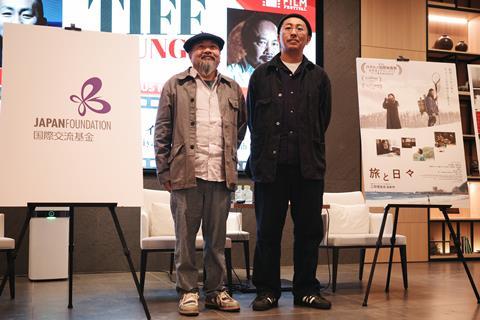
Japanese director Sho Miyake, whose Two Seasons, Two Strangers won this year’s Golden Leopard at Locarno, in is preparing his next film for release in 2027.
At an in-conversation session at Tokyo International Film Festival on Saturday (November 1), the filmmaker said of his next project: “I’m in preparation right now, working on the screenplay and casting.”
Miyake was joined by Rithy Panh, the feted Cambodian director of Oscar-nominated The Missing Picture, who led the Locarno jury that selected Miyake’s latest film for the top prize.
Panh’s latest film, We Are The Fruits Of The Forest, is playing in competition Tokyo while Miyake’s Two Seasons, Two Strangers opens in Japan on November 7 through Bitters End.
The Cambodian filmmaker also nodded to a future work and stated he has an ongoing project that he is shooting on super 8mm film “as a kind of rebellion against the mini formats of today”
Panh also commented on the current state of smartphone-centric filmmaking and said that while “I’m not against short-form content because it’s the modern format,” he and Miyake make films that “hopefully deserve to be watched on a big screen at a cinema.”
Asked further about future projects, Panh demurred and said that he might open a fast food restaurant (“It’s not a joke… I’m a really good cook!”) and that while he continually threatens to retire, his wife says he will never stop.
During the hour-long conversation as part of the festival’s TIFF Lounge series, the two mused on each other’s works and how they present the human condition on screen.
Based on manga by Yoshiharu Tsuge, Two Seasons, Two Strangers is about a screenwriter who goes on a journey to help work through her feelings.
“I can’t share what the jury discussed, but we did easily agree on the film,” said Panh of awarding Miyake’s film the top prize at Locarno. “I was very interested in its story about the loneliness of humans, and how people rely on each other and contemplate their lives. It’s about ordinary people but depicts important moments in their lives. I could see a lot of nature in the film as well.”
Miyake had similar praise for Panh’s We Are The Fruits Of The Forest, a documentary about Indigenous people in the remote mountains of northeastern Cambodia.
“Your work reminded me of my late grandfather and his hands,” said Miyake. “He was a farmer and was always working with the soil, so there was always something on them that he couldn’t wash off. Your film was full of working hands old and young, and it personally meant a lot to me.”
Panh reflected that his own hands were an issue during the reign of the Khmer Rouge in Cambodia in the 1970s. “I had delicate hands, and that put my life at danger because they were targeting bourgeois people,” he recalled. “The softness or roughness of one’s hands would give away their background or history.”
Expanding on the political dimension of his film, Panh said: “It includes the challenges of capitalism and environmental issues. For these minorities, natural elements like the soil, ground, trees, sun, and wind are very important for them, but industry is destroying such things. How they face up to those challenges is part of story.”
Exploring the commonalities between his and Miyake’s work, Panh said that “we both explore how people live, the small moments they live, with little details that really mean a lot… I want to portray people in their daily lives, how they share their lives together, aspects of human life, and how we interact with each other.”
Miyake said that although his films are fiction, he also strives to capture reality: “I work with actors, with people living in the current generation. If I don’t depict them now, I lose that moment. Ten years from now they’ll be a different people, so I want to capture this moment that I’m living in. That’s the basis of my work.”
Speaking about his work as an instructor, Panh remarked that while he does teach his students the practical aspects of filmmaking, the most important thing he tries to do is “have students think about what empathy means.”

























No comments yet